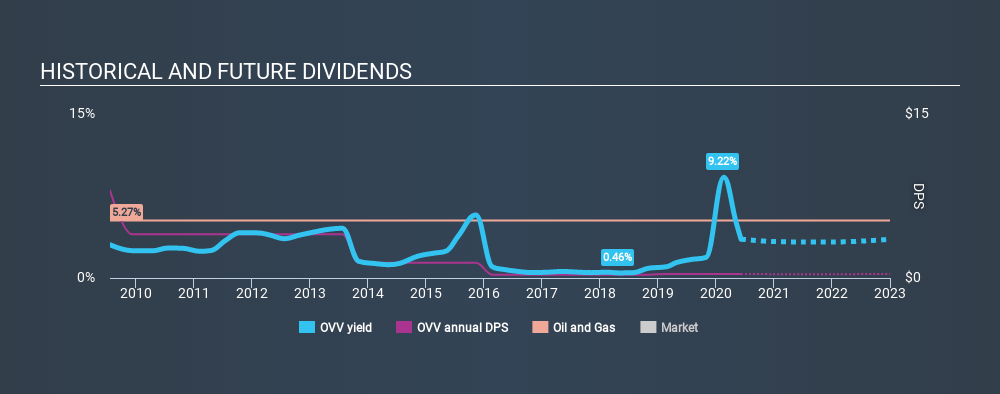Some investors rely on dividends for growing their wealth, and if you're one of those dividend sleuths, you might be intrigued to know that Ovintiv Inc. (TSE:OVV) is about to go ex-dividend in just 4 days. Ex-dividend means that investors that purchase the stock on or after the 12th of June will not receive this dividend, which will be paid on the 30th of June.
Ovintiv's next dividend payment will be CA$0.094 per share. Last year, in total, the company distributed CA$0.38 to shareholders. Based on the last year's worth of payments, Ovintiv stock has a trailing yield of around 3.6% on the current share price of CA$14.16. Dividends are an important source of income to many shareholders, but the health of the business is crucial to maintaining those dividends. That's why we should always check whether the dividend payments appear sustainable, and if the company is growing.
Check out our latest analysis for Ovintiv
Dividends are typically paid out of company income, so if a company pays out more than it earned, its dividend is usually at a higher risk of being cut. Ovintiv is paying out just 11% of its profit after tax, which is comfortably low and leaves plenty of breathing room in the case of adverse events. Yet cash flows are even more important than profits for assessing a dividend, so we need to see if the company generated enough cash to pay its distribution. It distributed 45% of its free cash flow as dividends, a comfortable payout level for most companies.
It's positive to see that Ovintiv's dividend is covered by both profits and cash flow, since this is generally a sign that the dividend is sustainable, and a lower payout ratio usually suggests a greater margin of safety before the dividend gets cut.
Click here to see the company's payout ratio, plus analyst estimates of its future dividends.

Have Earnings And Dividends Been Growing?
Companies with falling earnings are riskier for dividend shareholders. If business enters a downturn and the dividend is cut, the company could see its value fall precipitously. Ovintiv's earnings have collapsed faster than Wile E Coyote's schemes to trap the Road Runner; down a tremendous 32% a year over the past five years.
Another key way to measure a company's dividend prospects is by measuring its historical rate of dividend growth. Ovintiv's dividend payments per share have declined at 26% per year on average over the past ten years, which is uninspiring. While it's not great that earnings and dividends per share have fallen in recent years, we're encouraged by the fact that management has trimmed the dividend rather than risk over-committing the company in a risky attempt to maintain yields to shareholders.
Final Takeaway
Has Ovintiv got what it takes to maintain its dividend payments? Ovintiv has comfortably low cash and profit payout ratios, which may mean the dividend is sustainable even in the face of a sharp decline in earnings per share. Still, we consider declining earnings to be a warning sign. Overall we're not hugely bearish on the stock, but there are likely better dividend investments out there.
With that in mind, a critical part of thorough stock research is being aware of any risks that stock currently faces. Every company has risks, and we've spotted 4 warning signs for Ovintiv (of which 1 can't be ignored!) you should know about.
If you're in the market for dividend stocks, we recommend checking our list of top dividend stocks with a greater than 2% yield and an upcoming dividend.
Love or hate this article? Concerned about the content? Get in touch with us directly. Alternatively, email editorial-team@simplywallst.com.
This article by Simply Wall St is general in nature. It does not constitute a recommendation to buy or sell any stock, and does not take account of your objectives, or your financial situation. We aim to bring you long-term focused analysis driven by fundamental data. Note that our analysis may not factor in the latest price-sensitive company announcements or qualitative material. Simply Wall St has no position in any stocks mentioned. Thank you for reading.
About TSX:OVV
Ovintiv
Explores, develops, produces, and markets natural gas, oil, and natural gas liquids in North America.
Slight risk and fair value.
Similar Companies
Market Insights
Community Narratives



